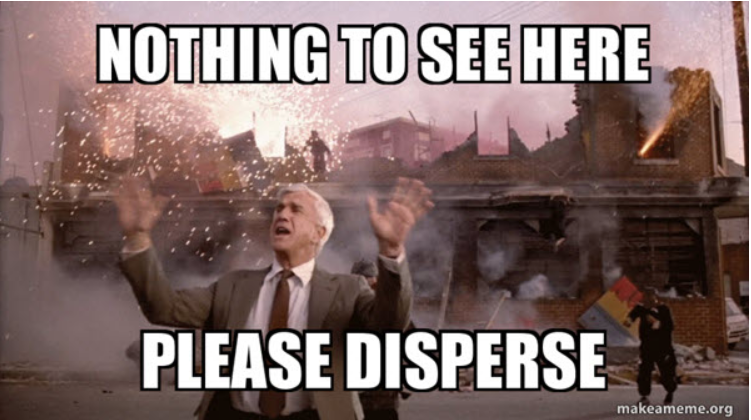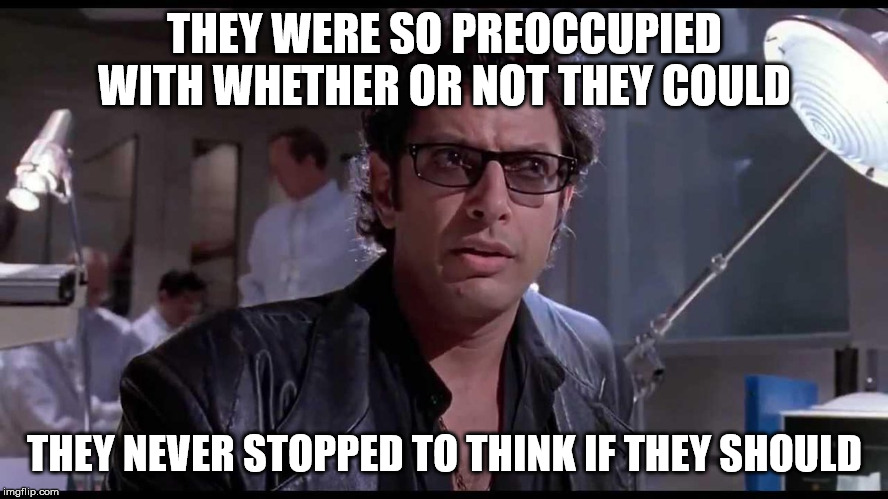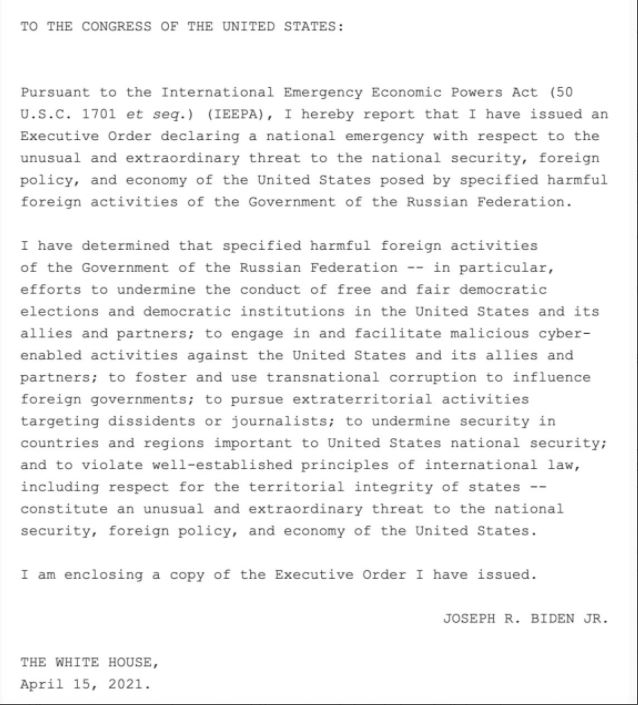It looks like you're using an Ad Blocker.
Please white-list or disable AboveTopSecret.com in your ad-blocking tool.
Thank you.
Some features of ATS will be disabled while you continue to use an ad-blocker.
share:
originally posted by: SkipperJohn
I just seen this on Twat. Looks like its getting real.
Joe hasn't received his WH stationary yet?
originally posted by: cherokeetroy
Skeptics vs. Cynics: Know Which Are Toxic?
The Difference Between A Skeptic and a Cynic
Let’s define the terms. According to the Oxford Dictionary:
Skeptic: A person inclined to question or doubt all accepted opinions.
Cynic: A person who believes that people are motivated purely by self-interest rather than acting for honorable reasonsI like that definition, but here’s one from the Free Dictionary that goes more to the point:
Cynic: A person whose outlook is scornfully and often habitually negative.
Skeptics can be extremely useful members of a team. They don't just accept ideas, proposals, opinions, or even “facts” as offered – they need to be convinced.
Skeptics like to look at data. They like to analyze. They like to assess. Skeptics like to weigh and measure and draw their own conclusions.
Skeptics don’t wear rose-colored glasses. Skeptics temper the enthusiasm – often in a good way – of the instantly enthusiastic and in the process often apply a level of analysis and rigor that transforms a good idea into a great idea — and just as important, help recognize bad ideas.
Cynics, on the other hand, are toxic. At a fundamental level they don’t believe in goodness. Cynics don’t believe in the capability of other people to overcome, to rise up, and to achieve. They don’t believe in new ideas because, at heart, they don’t believe in people (including themselves.).
Here are a few ways to tell the difference between a skeptic and a cynic:
· Skeptics look for holes in your idea because they want to help you plug those holes. Cynics look for holes so they can make them bigger and sink your idea.
· Skeptics ask questions to try to make your idea better. Cynics ask questions to try to make you look stupid or incompetent.
Skeptics say, “I’m not sure if you have enough data to support that… lets do some digging and figure it out.” Cynics say, “You don’t have enough data to support that. You’ll have to prove to me that you’re right.” (And you never can.)
Every team needs at least one skeptic. Every team needs at least one person willing to ask questions, identify potential problems, and point out when more analysis is necessary.
No team needs a cynic. No team needs a person who always says no… not because they don’t believe in ideas but because they don’t believe in people.
source
Back when I used to hang out on The Straight Dope message board, I noticed that the majority of people who describe themselves as skeptics are actually cynics. They claim to be open-minded, but they really aren't -- they're just trying to act out the part, probably to fool themselves as much as anybody else.
originally posted by: Justoneman
The date is set for the recount of Maricopa Co . The world is watching Maricopa Co
Time for the patriots to win one on the books so we don't have to do it with Bombers and combat. These cheaters need to go down legally and we can start unraveling the rest of the mess with a much better chance at minimal violence from our enemies inside the borders.
My concern: We have seen blatant cheating occur in our presidential election while DJT was still President, with safeguards supposedly in place but openly disregarded. We have seen evidence compiled and ignored. We have seen virtually all branches of government, all government agencies and institutions, fail spectacularly to provide any recourse. Why would we expect a recount now under the illegitimate administration created by that corrupt election to provide a different result?
.
For the record... Jim Jordan 6 min tweet video demanding OBJECTIVE SPECIFIC
measures of when Americans get their freedoms and rights back - Fauci gives no specific response.
Video is 6:14 mins long.
#614
URL is "This Video Will Get Donald Trump Elected"
Video is 6:14 mins long.
#614
Q !UW.yye1fxo No.65 📁
Jan 27 2018 01:20:59 (EST)
m.youtube.com...
URL is "This Video Will Get Donald Trump Elected"
a reply to: AndyFromMichigan
The whole time I have been on ATS I don't think I have come across anyone who actually fits the definition of a cynic. The author of that op piece had to hunt down one to make the piece work.
Seems to me some people just don't like their beliefs to be challenged and anyone who does it is aracist, nazi,
facist, cynic.
The whole time I have been on ATS I don't think I have come across anyone who actually fits the definition of a cynic. The author of that op piece had to hunt down one to make the piece work.
Seems to me some people just don't like their beliefs to be challenged and anyone who does it is a
edit on 15-4-2021 by daskakik because: (no reason given)
originally posted by: AndyFromMichigan
originally posted by: cherokeetroy
Skeptics vs. Cynics: Know Which Are Toxic?
The Difference Between A Skeptic and a Cynic
Let’s define the terms. According to the Oxford Dictionary:
Skeptic: A person inclined to question or doubt all accepted opinions.
Cynic: A person who believes that people are motivated purely by self-interest rather than acting for honorable reasonsI like that definition, but here’s one from the Free Dictionary that goes more to the point:
Cynic: A person whose outlook is scornfully and often habitually negative.
Skeptics can be extremely useful members of a team. They don't just accept ideas, proposals, opinions, or even “facts” as offered – they need to be convinced.
Skeptics like to look at data. They like to analyze. They like to assess. Skeptics like to weigh and measure and draw their own conclusions.
Skeptics don’t wear rose-colored glasses. Skeptics temper the enthusiasm – often in a good way – of the instantly enthusiastic and in the process often apply a level of analysis and rigor that transforms a good idea into a great idea — and just as important, help recognize bad ideas.
Cynics, on the other hand, are toxic. At a fundamental level they don’t believe in goodness. Cynics don’t believe in the capability of other people to overcome, to rise up, and to achieve. They don’t believe in new ideas because, at heart, they don’t believe in people (including themselves.).
Here are a few ways to tell the difference between a skeptic and a cynic:
· Skeptics look for holes in your idea because they want to help you plug those holes. Cynics look for holes so they can make them bigger and sink your idea.
· Skeptics ask questions to try to make your idea better. Cynics ask questions to try to make you look stupid or incompetent.
Skeptics say, “I’m not sure if you have enough data to support that… lets do some digging and figure it out.” Cynics say, “You don’t have enough data to support that. You’ll have to prove to me that you’re right.” (And you never can.)
Every team needs at least one skeptic. Every team needs at least one person willing to ask questions, identify potential problems, and point out when more analysis is necessary.
No team needs a cynic. No team needs a person who always says no… not because they don’t believe in ideas but because they don’t believe in people.
source
Back when I used to hang out on The Straight Dope message board, I noticed that the majority of people who describe themselves as skeptics are actually cynics. They claim to be open-minded, but they really aren't -- they're just trying to act out the part, probably to fool themselves as much as anybody else.
I remember that message board lol
Yes, cynicism seems to be the prevailing attitude, especially when politics are involved. It's because our thought processes become hard wired and it's nearly impossible to break free unless you are willfully intent and actually work on expanding your mind.
Chronic cynicism, coupled with chronic stress and other harmful factors, lead to mental and physical deterioration
edit on 15-4-2021 by cherokeetroy because: (no reason given)
“ Facts are not a coincidence...
George Floyd's girlfriend was Daunte Wright's teacher.
Daunte was a regular at the night club Chauvin and Floyd worked security at.
The officer who shot Daunte was Chauvin's cousin.
Am I the only one who didn't hear a gun shot in cam footage?”
t.me...
So officer Potter is a cousin of Chauvin? And Floyd’s gf was a teacher of Daunte.
Minneapolis vs. Big Apple (NYC)
Brooklyn Center vs. Brooklyn NY
Chauvin closing arguments will be Monday, April 19.
There’s something going on here... just not sure what’s up.
George Floyd's girlfriend was Daunte Wright's teacher.
Daunte was a regular at the night club Chauvin and Floyd worked security at.
The officer who shot Daunte was Chauvin's cousin.
Am I the only one who didn't hear a gun shot in cam footage?”
t.me...
So officer Potter is a cousin of Chauvin? And Floyd’s gf was a teacher of Daunte.
Minneapolis vs. Big Apple (NYC)
Brooklyn Center vs. Brooklyn NY
Chauvin closing arguments will be Monday, April 19.
There’s something going on here... just not sure what’s up.
originally posted by: SuperStudChuck
mobile.twitter.com...
“ BREAKING: Democrats planning legislation to expand the Supreme Court from 9 to 13 justices -
@theintercept”
Required commentary: Duh.
Where is the outraged opposition?
Remember the crap Trump got trying to fill legitimate vacancies on the court? The accusations of stacking the court?
The hypocrisy of the Democrats in simply jaw dropping.
But so is the passivity of the Republicans.
.
originally posted by: EndtheMadnessNow
Don't blink. Google is celebrating a white European male inventor today.
twitter.com...
Well, I do think the internet (much more than social media) is another milestone in the continuing development of human communication.
Language
Writing
Printing Press
Radio and TV
Internet
Each on has been used for both good and ill.
Each one has been censored by those in control.
.
edit on 4/15/2021 by cimmerius because: spelling
a reply to: SkipperJohn
Yes, I would say the Cyber / Banker war is really heating up. Who is Russia colluding with?
Link to the full lengthy EO...
Executive Order on Blocking Property with Respect to Specified Harmful Foreign Activities of the Government of the Russian Federation
FACT SHEET: Imposing Costs for Harmful Foreign Activities by the Russian Government
Trump EO 13873 - May 17, 2019: Securing the Information and Communications Technology and Services Supply Chain
Yes, I would say the Cyber / Banker war is really heating up. Who is Russia colluding with?
(ii) to be responsible for or complicit in, or to have directly or indirectly engaged or attempted to engage in, any of the following for or on behalf of, or for the benefit of, directly or indirectly, the Government of the Russian Federation:
(A) malicious cyber-enabled activities;
(B) interference in a United States or other foreign government election;
(C) actions or policies that undermine democratic processes or institutions in the United States or abroad;
(D) transnational corruption;
(E) assassination, murder, or other unlawful killing of, or infliction of other bodily harm against, a United States person or a citizen or national of a United States ally or partner;
(F) activities that undermine the peace, security, political stability, or territorial integrity of the United States, its allies, or its partners; or
(G) deceptive or structured transactions or dealings to circumvent any United States sanctions, including through the use of digital currencies or assets or the use of physical assets;
Link to the full lengthy EO...
Executive Order on Blocking Property with Respect to Specified Harmful Foreign Activities of the Government of the Russian Federation
FACT SHEET: Imposing Costs for Harmful Foreign Activities by the Russian Government
Treasury designated six Russian technology companies that provide support to the Russian Intelligence Services’ cyber program, ranging from providing expertise to developing tools and infrastructure to facilitating malicious cyber activities.
We will continue to hold Russia accountable for its malicious cyber activities, such as the SolarWinds incident, by using all available policy and authorities.
Expelling Diplomatic Personnel
The United States is expelling ten personnel from the Russian diplomatic mission in Washington, DC. The personnel include representatives of Russian intelligence services.
Further Responses to the SolarWinds Malicious Cyber Activity
Today the United States is formally naming the Russian Foreign Intelligence Service (SVR), also known as APT 29, Cozy Bear, and The Dukes, as the perpetrator of the broad-scope cyber espionage campaign that exploited the SolarWinds Orion platform and other information technology infrastructures.
The U.S. government is evaluating whether to take action under Executive Order 13873 to better protect our ICTS supply chain from further exploitation by Russia.
Trump EO 13873 - May 17, 2019: Securing the Information and Communications Technology and Services Supply Chain
The Department of Defense is taking steps to incorporate additional allies, including the UK, France, Denmark, and Estonia, into the planning for CYBER FLAG 21-1, which is an exercise designed to improve our defensive capabilities and resiliency in cyberspace.
originally posted by: SkipperJohn
I just seen this on Twat. Looks like its getting real.
Convoluted logic to say the least. How does Actor Joe know russia russia russia interfered with HIS, yes HIS, election if we cannot have a nation wide audit which could determine if it was russia russia russia that ELECTED HIM!!!!!
The logic is mind boggling.
Problem. Ukraine is a rats nest, how do we know? --- Biden crime family, money laundering, Burisma, Hunter, McCain, Klobuchar and tons more. Someone has to go in and it cannot be Joe who might still be VP of Ukraine.
originally posted by: AndyFromMichigan
originally posted by: cherokeetroy
Skeptics vs. Cynics: Know Which Are Toxic?
The Difference Between A Skeptic and a Cynic
Let’s define the terms. According to the Oxford Dictionary:
Skeptic: A person inclined to question or doubt all accepted opinions.
Cynic: A person who believes that people are motivated purely by self-interest rather than acting for honorable reasonsI like that definition, but here’s one from the Free Dictionary that goes more to the point:
Cynic: A person whose outlook is scornfully and often habitually negative.
Skeptics can be extremely useful members of a team. They don't just accept ideas, proposals, opinions, or even “facts” as offered – they need to be convinced.
Skeptics like to look at data. They like to analyze. They like to assess. Skeptics like to weigh and measure and draw their own conclusions.
Skeptics don’t wear rose-colored glasses. Skeptics temper the enthusiasm – often in a good way – of the instantly enthusiastic and in the process often apply a level of analysis and rigor that transforms a good idea into a great idea — and just as important, help recognize bad ideas.
Cynics, on the other hand, are toxic. At a fundamental level they don’t believe in goodness. Cynics don’t believe in the capability of other people to overcome, to rise up, and to achieve. They don’t believe in new ideas because, at heart, they don’t believe in people (including themselves.).
Here are a few ways to tell the difference between a skeptic and a cynic:
· Skeptics look for holes in your idea because they want to help you plug those holes. Cynics look for holes so they can make them bigger and sink your idea.
· Skeptics ask questions to try to make your idea better. Cynics ask questions to try to make you look stupid or incompetent.
Skeptics say, “I’m not sure if you have enough data to support that… lets do some digging and figure it out.” Cynics say, “You don’t have enough data to support that. You’ll have to prove to me that you’re right.” (And you never can.)
Every team needs at least one skeptic. Every team needs at least one person willing to ask questions, identify potential problems, and point out when more analysis is necessary.
No team needs a cynic. No team needs a person who always says no… not because they don’t believe in ideas but because they don’t believe in people.
source
Back when I used to hang out on The Straight Dope message board, I noticed that the majority of people who describe themselves as skeptics are actually cynics. They claim to be open-minded, but they really aren't -- they're just trying to act out the part, probably to fool themselves as much as anybody else.
AFM, it is a self appointed profession of oppositional referencing. Simply raise ones stature of purpose by saying the opposite of everything said or written.
One can spin that with an air of superiority by simply creating deconstructionist logic traps. Folks fall for it all the time, but by the time the realize it they've been hooked. Lawyers have a brand of it, as do moms and politicos, in particular they do it with an eye to getting the last word. Final say. Very important.
It really is neither cynical or skeptical. It is a pattern that lends itself nicely to a polarity existence because one just looks at the polar opposite and always says that.
Oddly, it is really predictable because the polarity is the defining point. Say "up" and said "skeptic" must find a way to say "down." Say "good" and "devils advocate" must find a way to say "bad." Say "in" and the "cynic" must say "out."
It is rooted in the system of the failed concept of deconstructionism, where everything concept has a flaw which invalidates it. Just create the flaw by finding the polar opposite and act snotty about it. If all else fails, name call.
originally posted by: SuperStudChuck
“ Facts are not a coincidence...
George Floyd's girlfriend was Daunte Wright's teacher.
Daunte was a regular at the night club Chauvin and Floyd worked security at.
The officer who shot Daunte was Chauvin's cousin.
Am I the only one who didn't hear a gun shot in cam footage?”
t.me...
So officer Potter is a cousin of Chauvin? And Floyd’s gf was a teacher of Daunte.
Minneapolis vs. Big Apple (NYC)
Brooklyn Center vs. Brooklyn NY
Chauvin closing arguments will be Monday, April 19.
There’s something going on here... just not sure what’s up.

a reply to: SkipperJohn
This is hilarious. They are pinning the Solar Winds hack on Russia. I’ve said here and other places repeatedly that IT WAS NOT RUSSIA. I’ve got friends in the right places still serving in the Intelligence community who have confirmed to me that someone wanted to make this look like Russia, but they in fact have no evidence that Russia actually did this. I believe it’s called the “Marble Framework” that was released by Wikileaks in the Vault7 drops that shows we have the ability to make a hack look like anybody we want.
Quite a valuable tool in the old tool belt.
This is hilarious. They are pinning the Solar Winds hack on Russia. I’ve said here and other places repeatedly that IT WAS NOT RUSSIA. I’ve got friends in the right places still serving in the Intelligence community who have confirmed to me that someone wanted to make this look like Russia, but they in fact have no evidence that Russia actually did this. I believe it’s called the “Marble Framework” that was released by Wikileaks in the Vault7 drops that shows we have the ability to make a hack look like anybody we want.
Quite a valuable tool in the old tool belt.
So, this is how it begins...Planet of the Apes...TransApeism
For the first time, U.S. and Chinese scientists have created embryos that are part human, part monkey, in an effort to find new ways to produce organs for transplants.
But some ethicists worry about how such research could go wrong.
Part Human, Part Monkey


For the first time, U.S. and Chinese scientists have created embryos that are part human, part monkey, in an effort to find new ways to produce organs for transplants.
But some ethicists worry about how such research could go wrong.
Part Human, Part Monkey


a reply to: PokeyJoe
Blame will naturally fall on the easy convenient target. You're on the right track, imo. What country never leaks from Snowden's lips?
The Vault 7 files that Wikileaks published showed the C!A is able to plant foreign "fingerprints" on computers to blame others for hacks... specifically UMBRAGE.
Blame will naturally fall on the easy convenient target. You're on the right track, imo. What country never leaks from Snowden's lips?
The Vault 7 files that Wikileaks published showed the C!A is able to plant foreign "fingerprints" on computers to blame others for hacks... specifically UMBRAGE.
originally posted by: RelSciHistItSufi
According to Mel Q on telegram - Joe Biden is making a speech on Russia at 4:30 pm EST...
Have you noticed whip is posting all caps gematria from DJT's statements? Interesting results. Especially consider the twit character limitation is off.
originally posted by: EndtheMadnessNow
So, this is how it begins...Planet of the Apes...TransApeism
For the first time, U.S. and Chinese scientists have created embryos that are part human, part monkey, in an effort to find new ways to produce organs for transplants.
But some ethicists worry about how such research could go wrong.
Part Human, Part Monkey
Fits here ^^^
Federal Government Caught Buying ‘Fresh’ Flesh Of Aborted Babies Who Could Have Survived As Preemies
Last week, legal accountability group Judicial Watch dropped a bombshell: a nearly 600-page report proving the U.S. government has been buying and trafficking “fresh” aborted baby body parts. These body parts, purchased by the U.S. Food and Drug Administration to “humanize” mice and test biologic drugs in scientific experiments, came from babies up to 24-weeks-old gestation, just weeks from being born.
_Trans_
a reply to: crankyoldman
Guess we shouldn't be shocked but damn that is disturbing to say the least. And some thought only China did such harvesting.
Email excerpts from that 575 page FOIA:
From the emails, BLT is bone marrow/liver/thymus.
August 26, 2015 email:
This quote is under "TERMS AND CONDITIONS OF SERVICES"
Judicial Watch’s new FOIA Request adds 575 pages of records [PDF]
According to wiki,
Which sources a 2012 paper posted on NIH. The history of the development on immunodeficient mice for humanized mice model dates back to 1962 but the R&D did not spin-off until 1995.
Garcia lab: ART and science of HIV persistence
UNC Department of Microbiology and Immunology
125 Mason Farm Road
6th Floor Marsico Hall
Chapel Hill, NC
This University resides in The “Triangle” area of Chapel Hill, Durham and Raleigh, most famously known for its three outstanding research universities (UNC-CH, Duke & NC State University) and the renowned Research Triangle Park (RTP).

Guess we shouldn't be shocked but damn that is disturbing to say the least. And some thought only China did such harvesting.
Email excerpts from that 575 page FOIA:
We will be making dual humanized BLT mice (human liver and the > BLT surgery) at the same time.
From the emails, BLT is bone marrow/liver/thymus.
August 26, 2015 email:
Btw, are you planning to attend the humanized mouse workshop in Zurich in January?
This quote is under "TERMS AND CONDITIONS OF SERVICES"
The recent advent of "humanized" mice that recapitulate the human hematopoietic system permits direct in vivo testing of the human immunogenicity of biologics. Such studies are critical for developing scientifically sound approaches for evaluating and mitigating risk to product quality caused by aggregates and/or other components of biologics.
2018-8723-000721
From: Howard, Kristina To: (b)(6) < (b> abr-inc.com>
Date: 1/11/2011 4:29:09 PM
Subject: Fetal Tissues
I received your email address from the Garcia lab at UNC where they trained me to make humanized mice. I am at the FDA and need to obtain fetal liver and thymic tissues and am wondering what your process for ordering/procurement is. If you are not the correct person to contact for new orders, I would appreciate if you could forward my request to the correct individual.
Sincerely, Dr. Kristina Howard
DVM, Ph.D. Commissioner's Fellow FDA/CDER/OPS/OBP/DTP
Judicial Watch’s new FOIA Request adds 575 pages of records [PDF]
According to wiki,
The discovery of the athymic mouse, commonly known as the nude mouse, and that of the SCID mouse were major events that paved the way for humanized mice models.
Which sources a 2012 paper posted on NIH. The history of the development on immunodeficient mice for humanized mice model dates back to 1962 but the R&D did not spin-off until 1995.
Garcia lab: ART and science of HIV persistence
March 4, 2016
In a new article in the Journal of Clinical Investigation, M&I Professor J. Victor Garcia and colleagues use humanized mice to understand how antiretroviral therapy (ART) affects HIV persistence in women. See the UNC News article:
UNC Department of Microbiology and Immunology
125 Mason Farm Road
6th Floor Marsico Hall
Chapel Hill, NC
This University resides in The “Triangle” area of Chapel Hill, Durham and Raleigh, most famously known for its three outstanding research universities (UNC-CH, Duke & NC State University) and the renowned Research Triangle Park (RTP).

new topics
-
iPhone Microphone Being Accessed by Unknown App
The Gray Area: 2 hours ago -
Democrats send letter to Biden urging him to ratify Equal Rights Amendment
US Political Madness: 8 hours ago
top topics
-
iPhone Microphone Being Accessed by Unknown App
The Gray Area: 2 hours ago, 6 flags -
Democrats send letter to Biden urging him to ratify Equal Rights Amendment
US Political Madness: 8 hours ago, 3 flags
active topics
-
music for the apocalypse
Music • 25 • : Hellmutt -
Post A Funny (T&C Friendly) Pic Part IV: The LOL awakens!
General Chit Chat • 7915 • : underpass61 -
Only two Navy destroyers currently operational as fleet size hits record low
Military Projects • 27 • : Scratchpost -
Democrats send letter to Biden urging him to ratify Equal Rights Amendment
US Political Madness • 5 • : Bluntone22 -
George Stephanopoulos and ABC agree to pay $15 million to settle Trump defamation suit
Mainstream News • 26 • : Lazy88 -
Mood Music Part VI
Music • 3736 • : Hellmutt -
-@TH3WH17ERABB17- -Q- ---TIME TO SHOW THE WORLD--- -Part- --44--
Dissecting Disinformation • 3716 • : RelSciHistItSufi -
Light from Space Might Be Travelling Instantaneously
Space Exploration • 30 • : cooperton -
Drones everywhere in New Jersey ---and Elsewhere Master Thread
Aliens and UFOs • 175 • : nugget1 -
iPhone Microphone Being Accessed by Unknown App
The Gray Area • 0 • : Roma1927


